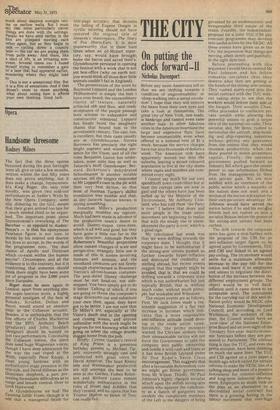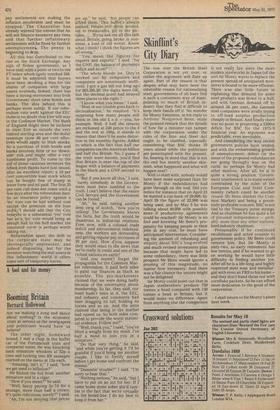THE CITY
On putting the clock forward—II
Nicholas Davenport
Before any more Americans tell us that we are 'drifting towards a condition of ungovernability' or 'sleep-walking into a social revolution' I hope that they will remove the beam from their own eyes and take a look at themselves. The great city of New York, one reads, is bankrupt and cannot even raise another loan. In other fabulous cities in the American heartland the large and expensive flats have become untenantable, even when offered at a nominal rent of $1 a week, because the service charges have run into thousands of dollars a week. The American rich have apparently moved out into the suburbs, leaving a mixed coloured population to live in the city slums where rapes and murders are committed every night.
I cannot say much for our own spendthrift town councillors but at least the corrupt ones are now in gaol and the others have just been pulled up by the Minister of the Environment, Mr Anthony Crosland, who has told them 'the Party is over.' I believe that more and more people in the trade union movement are beginning to realise that with the steady rise in unemployment the party is over, which is a good sign.
My conclusion last week was that we were drifting towards the corporate state. I thought that it might have to be authoritarian if the strong-arm unions pushed us further towards hyper-inflation and destroyed the credibility of sterling abroad, but recent events suggest that this tragedy might be avoided, that is, that we could be drifting towards a corporate state which is not authoritarian but just typically British, that is, without much order, without much principle, but workable and Wilson ian.
The recent events are as follows. First, Mr Jack Jones made a reasonable suggestion of a flat rate increase in incomes which indicates that a more responsible anti-inflation attitude could develop in the trade union camp. Secondly, the prime minister warned the Chrysler strikers that their unreasonable tactics will not force the Government to take the company into public ownership and coddle it with cash and loans as it has done British Leyland under Sir Don Ryder's Santa Claus encouragement. This suggests that after a favourable Referendum vote we might get firmer government from Mr Wilson. Thirdly, Mr Paul Johnson's highly charged socialist attack upon the selfish strong-arm unions who squeeze the community as a bunch of gangsters may awaken the complacent members of the Left to the dangers of being governed by an undemocratic and irresponsible third estate of the realm. Fourthly, the industrialists' proposal for a joint TUC/CBI pay restraint programme may develop into useful action by the NEDC. All these events have given us in the City the impression that things are moving, albeit slowly and painfully, in the right direction.
Before proceeding with this argument I would like to remind Mr Paul Johnson and his fellow romantic socialists that they deserve what they are getting at the hands of the strong-arm unions. They rushed starry-eyed into the social contract with the TUC without taking steps to see that the workers would deliver their side of the bargain. Their socialist Chancellor proceeded to confiscate private wealth while allowing the powerful unions to grab a larger slice of the national cut-cake. Their socialist idol, Mr Benn, rushed to nationalise the aircraft, ship-building and ship-repairing industries without getting any guarantee from the unions that they would increase productivity when the State poured in stolen investment capital. Finally, the socialist government pushed forward an Industry Bill which gave the unions power to use information filched from the managements to their own private gain. We are now saddled with an extension of the public sector which a majority of the nation does not want and a section of the nation will exploit for their own pecuniary advantage. Mr Johnson would have served the nation better if he and his soci4list friends had not rushed us into a socialist Britain before the power of the strong-arm unions had been curbed.
The drift towards the corporate state has gone a step further with the proposal of the CBI for an anti-inflation target figure to be agreed upon by Government, TUC and CBI and linked to an • agreed pay ceiling. The trilunvirate would settle for a maximum allowable increase in the pay bill for the nation and leave it to employers and unions to negotiate the distribution of the increase between the different employment groups. The object would be to 'roll back' inflation until it came down to an acceptable level. The instrument for the carrying out of this anti-inflation policy would be NEDC (the National Economic Development Council) and according to Lord Watkinson, the architect of the plan, the Council would have an 'over-view' of the National Enterprise Board and an over-sight of the Treasury five-year macro-economic forecasts before they are presented to Parliament. The curious thing is that the TUC, and even the prime minister, have been thinking on much the same lines. The TUC and CBI agreed on a joint paper a month ago which called for certain reforms to make the NEDC less of a talking-shop and more of a positive instrument for counter-inflation and long-term industrial development. Employers no doubt look on the plan as an alternative to a discredited social contract but there is h growing feeling in the labour movement that over-high 'pay settlements are making the, inflation .intolerable and must be stopped:, The Chancellor has already warned'the unions that he will not finance excessive pay rises; and that •further inflationary settlements‘wili.be fined by further unemployment:. The penny is beginning tO. drop.
All this has .eontributed to the rise on the Stock Exchange. Any sign of firmer government, as I have said,adds a Point or two to the FT index which lately touched 356. It must be admitted that buyers have been shOW' ing a bias, for the shares of.. companies with large assets overgeds,, Indeed, there has been a strong-movement into Irish Government short-term bonds and banks. The idea behind this is perhaps more subtle. If our referendum vote went against the EEC there is no doubt that Eire will stay in the Conimon. Market. The Bank of England, rifight then be inclined to treat. Eire as outside the very limited sterling area and the dollar premium (now 80 per cent effective), Would .apply to Irish stocks. So'a 'purchase of Irish bonds and bank i involves, little or no 'downside' .risk. and. might offer a very handsome profit. To come to the aid' of 'these cautious investors the Allied: Irish Banks have just issued, .after an excellent report, a 10 per .,Cent -convertible loan stock which can, be bought free of stamp in letter form and nil paid. The first 25 per. cent call does not come until a • few days after the referendum date.
. 'So. an insurance policy against a .vote can be had without cost except: the premium on the loan stotk: I should add that the City belieybs in a substantial 'yes' vote but ava .'no' vote would bring an abrupt halt to the bull market the insurance cover is perhaps worth • taking, out. • . ReferendUrri apart, the drift to the. corporte state may be ideologically '-uripleasant, and • indeed disgusting, but for the investor searching for real assets in this inflationary 'World it offers some sort of temporary haven.



























 Previous page
Previous page